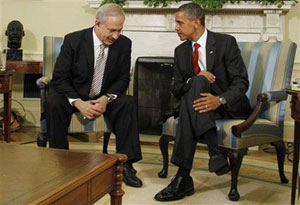|
 Israeli Prime Minister Benjamin Netanyahu meets with President Barack Obama in the Oval Office of the White House in Washington, D.C., 06 Jul 2010. |
Although a main focus of the Oval Office meeting was Israel-Palestinian peace efforts, global steps to pressure Iran to change the course of its nuclear program were also high on the agenda.
President Obama referred to the UN sanctions as the toughest ever directed at an Iranian government, and he cited the new unilateral US sanctions he signed into law targeting Iran's refined petroleum needs and energy sector.
Mr. Obama said he hopes these and similar actions expected in coming weeks and months will persuade Iranian leaders to change direction.
"Other countries are following suit, and so we continue to put pressure on Iran to meet its international obligations and to cease the kinds of provocative behavior that has made it a threat to its neighbors and the international community," said President Obama.
Describing the prospect of an Iranian nuclear weapon as the greatest new threat on the horizon, Mr. Netanyahu urged other nations to adopt tough sanctions aimed at Iran's energy sector.
The Israeli leader responded this way when asked by a reporter whether the new UN sanctions will contain or halt Iran's nuclear ambitions:
"The latest sanctions adopted by the UN create illegitimacy, or create de-legitimization, for Iran's nuclear program, and that is important," said Prime Minister Netanyahu. "I think the sanctions the president signed the other day actually have teeth, they bite. The question is how much do you need to bite is something I cannot answer now. But if other nations adopted similar sanctions that would increase the effect."
In addition to specifically addressing the Iranian nuclear issue, the White House talks brought a renewed, strong statement of US support for Israel's security requirements.
President Obama said he and Mr. Netanyahu discussed what he called issues arising out of an international conference earlier this year to review the Nuclear Nonproliferation Treaty.
Addressing reporters in the Oval office, Mr. Obama made a point of stating that he had reassured Prime Minister Netanyahu that there has been no change in US policy, adding that the US remains committed to Israel's security.
"Given its size, its history, the region it is in and the threats that are leveled against it, Israel has unique security requirements, it's got to be able to respond to threats or any combination of threats in the region," said President Obama. "And that is why we remain unwavering in our commitment to Israel's security, and the US will never ask Israel to take any steps that would undermine their security interests."
Iran maintains that its nuclear program is for peaceful purposes and rejects suggestions that its uranium enrichment activities are aimed at producing fuel for a nuclear weapon.
The remarks by President Obama and Prime Minister Netanyahu came as Iran, in a letter to the European Union, said it would be prepared to resume talks on its nuclear program in September.
However, the letter reiterated conditions set by President Mahmoud Ahmadinejad, including a requirement that participating countries not take a hostile or confrontational tone in talks, and that they state whether they oppose Israel's suspected nuclear arsenal.
arsenal: a building where military weapons and explosives are made or stored 兵工厂;武器库;军火库
UN Security Council adopts tough new round of Iran sanctions
Afghanistan, Iran become issues in British election race
Iran starts work on new nuclear plant
China under pressure on Iran nuke issue
(来源:VOA 编辑:陈丹妮)
